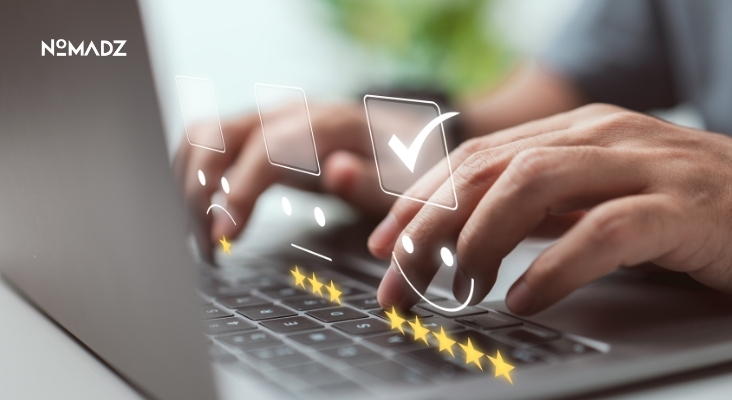How to Choose the Right Reputation Management Software for Your Business?
Your reputation online can either make or destroy your business. A single bad review or comment can hurt your brand’s perception. This is where reputation management software comes in handy. It assists you in tracking, controlling, and enhancing your online image efficiently.
But with so many choices, deciding on the right one might be tricky. This blog will guide you through the basic steps to picking the perfect software for your business requirements.
Selecting the Most Suitable Software to Manage Your Online Reputation
Your reputation must be managed to establish trust and engage customers. One bad review can fly around the internet and drive purchasing decisions. With reputation management software, you can see, review, and act on the opinions you get on different platforms.
If you want to know what online reputation management is, let me tell you it’s all about improving how your business is recognised on different online sites. There are so many software options that picking the right one can be difficult.
When running a business of any size, use tips to choose software that suits your aims and offers brand protection.
Also Read: Best Social Listening Tools and Their Ideal Users
Determine What You’re Currently Struggling With and Need
Begin by understanding what you would like the software to do. Is there poor feedback on Google? Variable reviews on review sites? No visibility into what is being said about your brand? Small business reputation management software can emphasise ease of use and cost-effectiveness.
Large organisations require sophisticated review management software with automation and reporting.
Look for Key Features That Align With Your Approach
Good reputation management software should provide visibility on all major review platforms, provide sentiment analysis, and allow you to respond to reviews from one dashboard. Be sure to find native analytics to monitor trends over time.
Some systems offer free reputation management tools, which you can test before investing in a paid version. Be sure the features align with your business objectives without increasing the processes. Effective reputation monitoring tools will help you seamlessly track mentions and reviews across platforms.
Think About Ease of Use and Setup Time
Your team should be assisted by online reputation software, not confused. Harsh dashboards and difficult learning processes can waste your time and productivity. A tidy interface, mobile-friendliness, and live notifications should be the norm. Mostly, the providers will give you demos or trials.
The demos let you preview the platform’s usability and see if it fits your workflow.
Also Read: Must-Have Social Media Tools for a Small Business in 2025
Assess Customer Support and Training Materials
Reputation concerns don’t observe business hours. Your reputation management software provider needs to offer good support during times of need. Look for onboarding sessions, help centres, live chat, or assigned account reps. Small businesses without a full marketing team can find this support especially valuable.
It makes a big difference in their experience with online reputation management services.
Consider Scalability and Flexibility
Your company might expand, and your requirements will increase with it. Select a solution that aligns with your aspirations. A simple review management platform might do the trick now. When your presence grows, you might require features such as competitor tracking, review request automation, or support for multiple locations.
The best tools have tiered pricing or scalable plans that expand with you.
Compare Prices Clearly
Pricing varies; some charge by location, others by user, or based on the features you can access. Watch out for hidden fees or limits in less packages. Free reputation management tools can handle simple needs, but most expanding businesses will eventually need more premium ones.
A good review management software should provide great value without being overpriced for what it offers.
Check Independent Reviews and Industry Opinion
Use comparison websites, social media forums, and marketing boards to scan user feedback. Search for red flags like bad customer service, a slow interface, or data accuracy problems. Online reputation management companies tend to promote case studies. Be cautious and try to verify claims using independent sources when you can.
Verify Integration with Current Systems
Reputation management is most effective when it integrates smoothly with your CRM, email marketing software, or customer service solution. If your review management tool does not integrate easily, it may generate more work than simplifying things. Easy integration enables tracking customer touchpoints, quicker responses, and improved personalisation.
Look for reputation monitoring tools that can easily sync with your existing systems.
Inquire About Reporting and Automation
Any reputation management software should have automated alerts and the ability to customize and schedule reports. These features help you save time and exert more influence on how your company appears online. You should also examine trends, sentiment, and source data closely.
Marketing Automation can also boost engagement, particularly when gathering reviews.
Test the Software Before Committing
Most reputation management software providers offer a demo or trial period. Use this time to bring in your team, simulate real scenarios, and evaluate the system’s performance. Look at how fast it gathers reviews, how easy it is to respond, and whether it actually reduces manual work.
Always understand the platform fully before signing any long-term contracts.
Also Read: 12 Social Media Monitoring Tools You Should Use in 2025
Conclusion: Choosing the Right Reputation Management Software
Selecting the proper reputation management software is more than comparing features. It’s discovering a solution that accommodates your needs, allows for future expansion, and centralises all your feedback. The proper tool can streamline how you monitor, manage, and react to reviews on all platforms.
Whether you operate individually or have an organisation behind you, spending money on the proper software protects your brand and establishes long-term credibility where it’s most important.
FAQs
Q. How do I maintain my online reputation?
A. To build a strong reputation, use reputation tools that track reviews, reply to feedback quickly, and keep your message the same across all websites.
Q. Why is reputation management software important for businesses?
A. It helps businesses monitor reviews, respond quickly, and maintain a positive brand image across online platforms, directly impacting customer trust and sales.
Q. What is the best social listening tool?
A. Brandwatch, Sprout Social, and Mention are our top recommendations for monitoring live conversations and brand perception on social media.
Q. What is an ORM strategy?
A. An ORM strategy involves monitoring, analysing, and influencing your online presence to maintain a positive brand image.
Q. What is the best Google review management tool?
A. Consider platforms like Birdeye, Podium, or Yext with direct Google integration and support for centralised response handling through reputation management software.









Leave feedback about this